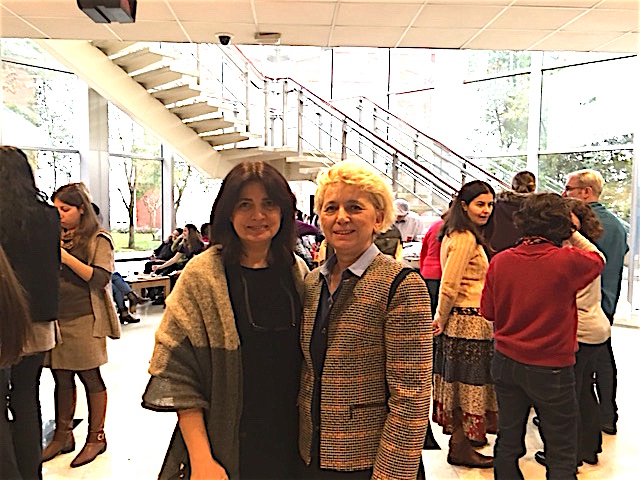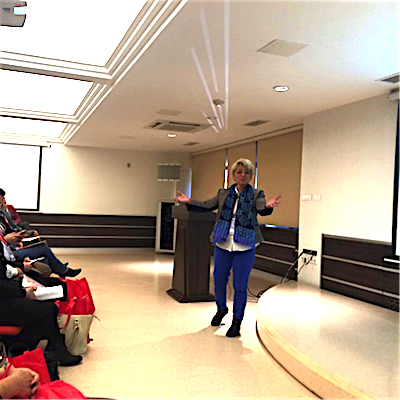Personal and Institutional Development
 Personal and Institutional Development: 2nd TPLUS & TESOL Arabia SIGs Joint Event at Bilkent University
Personal and Institutional Development: 2nd TPLUS & TESOL Arabia SIGs Joint Event at Bilkent University
by
Nezaket Özgirin & Meral Güçeri
The 7th T-PLUS Event was held at Bilkent university as a joint organization by T-PLUS, TESOL Arabia and Bilkent University on November 20th and 21st, 2014. The theme was ‘Personal and Institutional Development’ and Meral Güçeri and Christine Coombe gave two inspiring plenaries that were titled ‘Shades of Blue’ and ‘Professionalizing Your English Language Teaching’.
Shades of Blue
Meral Güçeri started her plenary session by sharing her findings related to the colour blue in psychology and established links between teaching and the qualities of blue. She highlighted tranquility and loyalty, peace and truth, goodness and optimism and harmony as the qualities most teachers have or are supposed to have. Particularly when blue is associated with the sea and the sky, Meral said “the color blue especially correlates well with teaching and learning since the teaching and learning context requires in-depth research and analysis.” Then, she quoted from Giddens (1991)
“The self is a reflexive project. The existential question of self identity is bound up with the fragile nature of biography which the individual ‘supplies’ about herself. ” (p.54)
She connected it with Foucault(1998):
“If the self is ‘made’, rather than inherited or just passively static, what form is it in? What is the thing that we make? ….We create, maintain and revise a set of biographical narratives – the story of who we are, and how we came to be where we are now.” (Giddens, in Gauntlett 2008, p.107)
Meral asserted that we recreate our personal and professional identity by improving our ‘self’ going through a wide range of developmental opportunities. While developing ‘self’, she emphasised that the only competitor of the individual is supposed to be herself. She invited all the audience to discover self and enjoy recreating identity by growing personally and professionally, hence, enjoying the glory of life long learning. Next, she explored teacher presence and its impact in achieving excellence in language instruction and discussed the conditions that are essential for quality professional learning so that teachers prepare their students for the skills that they need in the 21st century.

Dr Güçeri shared her research study on what ELT instructors (2015) say about professional learning and development. Teachers believe it is a reflective practice which is to be considered as a non ending journey with a constant feeling of incompleteness. Therefore, development opportunities should be relevant, interactive, hands on, ongoing, expanding horizons, practical and encouraging collaboration to improve student outcomes. She provided a long list of professional learning tools including Action Research, Project Based Learning, Professional Learning Communities, Personal Learning Network and the like.

Güçeri (2014, p.182) emphasised the role of teacher leadership in school improvement refering to her study and discussed how and in what ways teachers utilise their inservice teacher training knowledge that they gain to facilitate organisational change in their institutions. The results of her research with 69 MEB teachers reveal the following assertions as teacher leaders develop the capacity to initiate change at schools; to navigate new tasks in schools; to establish a learning culture in the staff rooms; to model professional growth; to help others with change; build confidence to perform tasks district wide; to encourage cooperative development; to promote professional development and to bring/initiate change to school culture
The above takes place if and when team work is established, support and encouragement is provided, and resources are made available. There appears the issue of collaboration and effective team work at all levels. In addition, this research study reveals that teacher motivation should be kept high not only by enhancing further development activities, but also schools should establish a learning culture where all teachers and administrators develop their professional knowledge and skills. Moreover, the awareness of school administrators should be raised on recent developments in education highlighting current initiatives and changes that are taking place in the country and the world. Teacher leadership and empowerment should be emphasised to enhance quality tuition and excellence in education.
Finally, Meral Güçeri shared performance evaluation systems employed by various educational institutions in Turkey and the world highlighting their correlations with on-going professional development. She recapped smarter targets, which lead to personal and professional development and provide valuable performance evaluation tools.
Professionalizing Your English Language Teaching by Christine Coombe
The second plenary session was by Christine Coombe who talked about what is involved in being a teaching professional: not only having the credentials but also being committed, innovative and transformative in the classroom, helping both students and colleagues in the achievement of their goals. She anaylsed different definitions for professionalism, one of which was by Bowman (2013) who said ‘professionalism is less a matter of what professionals actually do and more a matter of who they are as human beings’.
 According to Coombe (2014) a true teaching professional is a person who puts customer or student satisfaction first; has expert and specialized knowledge in teaching, exhibits excellent practical/communication skills; does high quality work, even more than is expected; demonstrates high standards of professional ethics (behaviour & activities); shares knowledge and expertise; praises peers not themselves; has a positive attitude even during tough times. Contributing elements to professionalism were listed as having thorough knowledge (Snoek, 2009), skills, and attitudes which require a lot of dedication, willingness and commitment towards student learning, the profession, the outside world, professional development, the improvement and innovation of teaching.
According to Coombe (2014) a true teaching professional is a person who puts customer or student satisfaction first; has expert and specialized knowledge in teaching, exhibits excellent practical/communication skills; does high quality work, even more than is expected; demonstrates high standards of professional ethics (behaviour & activities); shares knowledge and expertise; praises peers not themselves; has a positive attitude even during tough times. Contributing elements to professionalism were listed as having thorough knowledge (Snoek, 2009), skills, and attitudes which require a lot of dedication, willingness and commitment towards student learning, the profession, the outside world, professional development, the improvement and innovation of teaching.
The strategies for increasing professionalism were stated to be: knowing that first impressions count, increasing overall effectiveness, having the requisite specialized knowledge, emulating those teachers who can be labelled as professional, becoming more self-aware, wearing professional attire and being well groomed, developing self-confidence, communicating effectively in both writing and speaking, listening attentively and actively, supporting your colleagues, following administrative directives, thinking about the vocabulary you use, asking questions, being reflective and being a professional citizen. In brief, she left the audience saying that ‘a professional teaching qualification does not make you a professional’, encouraging them to use all the opportunities to reflect on themselves and to look for strategies wherever possible.
 Some other sessions attended were Hold the Mirror to Thyself: A case of performance evaluation’ given by Arda Bayraktaroğlu; ‘Keeping Our Eyes on the Ball, Even When It Changes! by Grant Kempton and ‘Aiming for Excellence in Language Education’ by Ben Knight. These sessions were also thought provoking and created an atmosphere for intensive discussion on controversial issues, such as the ‘assessment’ of instructors through annual appraisal meetings, different approaches towards observation: planned, unplanned and drop-in observations, and the use of the ‘Cambridge English Teaching Framework’. All these sessions were useful to see the extent to which individuals or institutions vary not only in the way they approach development and evaluation, but also in the tools they prefer to use. In her session Nezaket Özgirin questioned the role of individuals in the growth and development of learning institutions. In her workshop she raised awareness of different perceptions on professional development through a survey and group discussion. Later she described a project that focused on communication and team-dynamics describing how the needs were found and what actions were taken within the teams that work with each other closely throughout a semester.
Some other sessions attended were Hold the Mirror to Thyself: A case of performance evaluation’ given by Arda Bayraktaroğlu; ‘Keeping Our Eyes on the Ball, Even When It Changes! by Grant Kempton and ‘Aiming for Excellence in Language Education’ by Ben Knight. These sessions were also thought provoking and created an atmosphere for intensive discussion on controversial issues, such as the ‘assessment’ of instructors through annual appraisal meetings, different approaches towards observation: planned, unplanned and drop-in observations, and the use of the ‘Cambridge English Teaching Framework’. All these sessions were useful to see the extent to which individuals or institutions vary not only in the way they approach development and evaluation, but also in the tools they prefer to use. In her session Nezaket Özgirin questioned the role of individuals in the growth and development of learning institutions. In her workshop she raised awareness of different perceptions on professional development through a survey and group discussion. Later she described a project that focused on communication and team-dynamics describing how the needs were found and what actions were taken within the teams that work with each other closely throughout a semester.
In brief, twenty-seven different sessions focused on different aspects of personal, professional and institutional development as well as the application of performance evaluation systems in various institutions. The participants also took part in focus group discussions moderated by Beril Yücel, Bahar Gün, Sibel Tüzel Köymen, Hande Mengü, Christine Coombe and Nezaket Özgirin. Finally, the panel discussion at the end of the event where John O’Dwyer, Tijen Akşit, Christine Coombe and Sibel Tüzel Kandiller took part offered inspirational perspectives and guidelines to the issues raised through focus group discussions.
